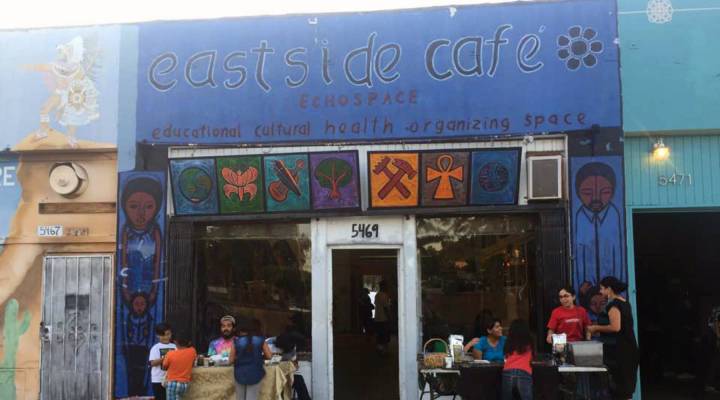
How an LA community is fighting back against gentrification
How an LA community is fighting back against gentrification

As the Eastside Café in Los Angeles’ El Sereno neighborhood welcomes visitors for an art exhibition on a recent evening, Roberto Flores motions to the donation jar on a table out front.
“By the way, we don’t charge here, for anything,” he said.
There’s no coffee in sight, because this place isn’t really a cafe. It’s a community organizing space inspired by the Zapatistas, a Mexican indigenous revolutionary group whose art hangs on the walls tonight.
The Eastside Café has been here for almost 15 years, hosting everything from English and jiu-jitsu classes to a healing circle and folk music collective. It’s all focused on renewing the communal identity of this 80 percent Latino neighborhood.
“We are in favor of reconstructing our community,” Flores said. “The flip side of that is that we don’t like gentrification, we don’t like displacement.”
With property prices rising rapidly and too few affordable homes to go around, many historically working-class Latino neighborhoods around El Sereno are attracting new levels of first-time homebuyers and trendy retail development. Flores’ daughter, Angela, puts on renter’s rights workshops here and founded a group called El Sereno Against Gentrification three years ago.
“I started to feel like that’s probably going to hit El Sereno soon,” Angela said. “And I could see it in the residential areas where there’s a lot of these restorations and “for sale” signs on people’s homes.”

Nati Carrera and Angela Flores play traditional folk tunes from Veracruz at the Eastside Café’s weekly music circle.
This May, those gentrification forces came knocking on the Eastside Café’s door. The group discovered a strip mall developer had begun the process of buying the building they rent from for $1.2 million. When the buyer came by for a walk-through, Roberto said they confronted him.
“We invited him in, sat him down, showed him a video of what we do here,” Roberto said. “We asked him if he was conscious of, you know, that he was going to be destroying a whole lot, and that he was going to be doing it to make profits.”
Roberto said the group made an impression on the buyer.
“He came back and said, ‘OK, I’ll tell you what I’m going to do. I’m going to give you 10 days to come up with a bonafide offer. But if you don’t come up with a bonafide offer, then I am going to buy it, and I don’t want you guys chasing me around.’”
They figured they needed about $200,000 for a down payment. No one person had that kind of money, but Roberto had always dreamed of the community itself owning the place. So he put the word out for contributions. The next day, musicians Aloe Blacc and Maya Jupiter gave $60,000 to the cause.
“There are other buyers waiting in the wings,” Blacc warned in a Facebook video urging others to donate. “A developer wants to buy the building, and the Eastside Café has nine days to get ahead of it.”
More money started coming in. By the time the 10 days were up, they’d raised $120,000, enough to open escrow on the building and get the other buyer to walk away.
They’ve since raised $160,000, and are on their way to owning the building. It’s been all hands on deck.
“We’ve kind of had to learn a lot really fast about real estate, and we’ve been reaching out to people like lawyers and foundations,” said Eastside Café regular Nati Carrera. “So we’ve kind of really ramped up our knowledge base to purchase the building.”
There’s one irony here. With six other storefronts in the building, Flores and the anti-capitalist Eastside Café will be in the awkward position of being landlords.
“We want to make sure that we are able to sustain this place, and not have to raise rents in a shocking way that is going to displace people,” Roberto said. “The whole effort is against gentrification, so we need a lot help.”
To bring in some revenue, the Eastside Café will finally start selling coffee — Zapatista-grown coffee from Chiapas, Mexico. But Angela Flores said this cafe won’t be like the hip coffee shops opening nearby.
“They’re run as businesses, and we’re going to have something like a co-op,” she said. “It’s going to be run by the community. I think people really want to see something like that here.”
There’s a lot happening in the world. Through it all, Marketplace is here for you.
You rely on Marketplace to break down the world’s events and tell you how it affects you in a fact-based, approachable way. We rely on your financial support to keep making that possible.
Your donation today powers the independent journalism that you rely on. For just $5/month, you can help sustain Marketplace so we can keep reporting on the things that matter to you.












